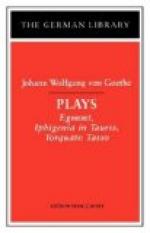Carpenter. What ails thee, maiden?
Clara. Can ye misunderstand me? I speak
of the Count! I speak of
Egmont.
Jetter. Speak not the name! ’tis deadly.
Clara. Not speak his name? How? Not Egmont’s name? Is it not on every tongue? Where stands it not inscribed? Often have I read it emblazoned with all its letters among these stars. Not utter it? What mean ye? Friends! good, kind neighbours, ye are dreaming; collect yourselves. Gaze not upon me with those fixed and anxious looks! Cast not such timid glances on every side! I but give utterance to the wish of all. Is not my voice the voice of your own hearts? Who, in this fearful night, ere he seeks his restless couch, but on bended knee will, in earnest prayer, seek to wrest his life as a cherished boon from heaven? Ask each other! Let each ask his own heart! And who but exclaims with me,—“Egmont’s liberty, or death!”
Jetter. God help us! This is a sad business.
Clara. Stay! Stay! Shrink not away at the sound of his name, to meet whom ye were wont to press forward so joyously!—When rumour announced his approach, when the cry arose, “Egmont comes! He comes from Ghent!”—then happy indeed were those citizens who dwelt in the streets through which he was to pass. And when the neighing of his steed was heard, did not every one throw aside his work, while a ray of hope and joy, like a sunbeam from his countenance, stole over the toil-worn faces that peered from every window. Then, as ye stood in the doorways, ye would lift up your children in your arms, and pointing to him, exclaim: “See, that is Egmont, he who towers above the rest! ’Tis from bird that ye must look for better times than those your poor fathers have known.” Let not your children inquire at some future day, “Where is he? Where are the better times ye promised us?”—Thus we waste the time in idle words! do nothing,—betray him.
Soest. Shame on thee, Brackenburg! Let her not run on thus! Prevent the mischief!
Brackenburg. Dear Clara! Let us go! What will your Mother say? Perchance—
Clara. Thinkest thou I am a child, or frantic? What avails perchance?— With no vain hope canst thou hide from me this dreadful certainty . . . Ye shall hear me and ye will: for I see it, ye are overwhelmed, ye cannot hearken to the voice of your own hearts. Through the present peril cast but one glance into the past,—the recent past. Send your thoughts forward into the future. Could ye live, would ye live, were he to perish? With him expires the last breath of freedom. What was he not to you? For whose sake did he expose himself to the direst perils? His blood flowed, his wounds were healed for you alone. The mighty spirit, that upheld you all, a dungeon now confines, while the horrors of secret murder are hovering around. Perhaps he thinks of you—perhaps he hopes in you,—he who has been accustomed only to grant favours to others and to fulfil their prayers.




